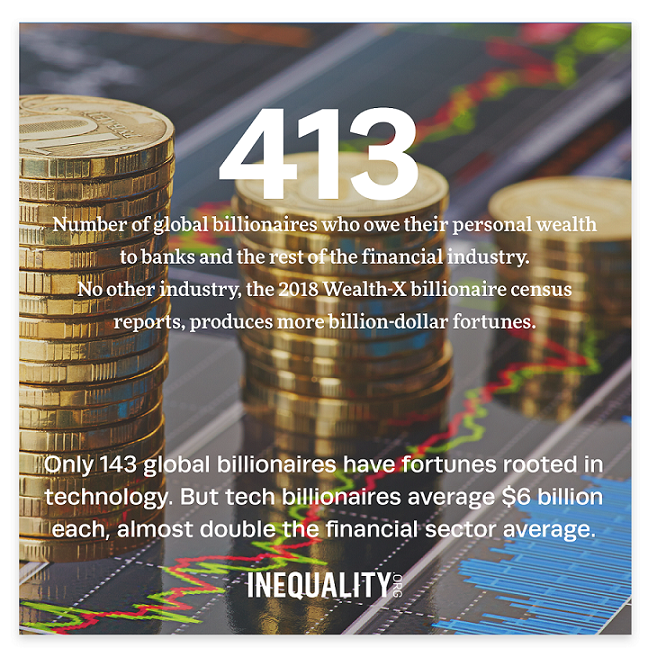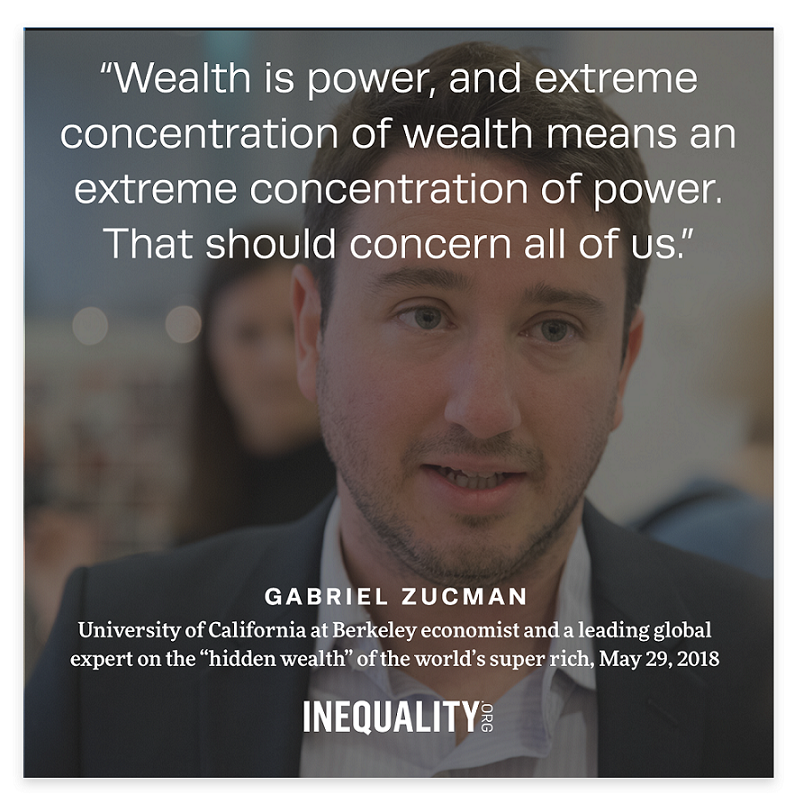Income ceilings could give us a world without the super rich.
|
THIS WEEK
|
Have you seen any raise in your paycheck over the past 12 months? If not, you have company. Researchers at the Kansas City Federal Reserve have found that 14.3 percent of American workers haven’t received a single penny in wage hikes over the past year.
For top corporate execs, of course, it’s a completely different story. Their pay, details a new Equilar analysis for the New York Times, jumped 14 percent in 2017.
So what do we do about numbers like these? Maybe we ought to start thinking, suggests a new book from my Institute for Policy Studies colleague Sam Pizzigati, about setting a maximum wage. The Nation magazine has just printed an excerpt from Sam’s book, and we’re pleased to be able to highlight — at the end of this week’s issue — a special publisher’s half-price offer.
Please take a look! The time has come for bold ideas.
Chuck Collins, for the Institute for Policy Studies Inequality.org team |
|
|
|
|
INEQUALITY BY THE NUMBERS
|
 |
|
|
|
|
|
|
FACES ON THE FRONTLINES
|
 |
Moving Towards a Green Economy in Kentucky
|
| The school year has just wrapped up for Kevin Short, which means he has more time to dive into political activism. The high school student is a member of Kentuckians for the Commonwealth, a state partner of the national Poor People’s Campaign, and one of the many voices pushing Kentucky towards an economy that values people and the planet over profits. Inequality.org co-editor Negin Owliaei has more. |
|
|
|
|
WORDS OF WISDOM
|
 |
|
|
|
|
|
PETULANT PLUTOCRAT
OF THE WEEK
|
 |
| A Sensitive CEO Wants Props for His Sensitivity |
| Jim Murren, the CEO of gaming giant MGM Resorts International, is feeling more than a little peeved. Last month he blasted the investor community for not recognizing his company’s efforts to promote women into management. Investors, Murren charged, “talk about wanting companies with a good conscience, but they’re really looking for companies that are going to make them a lot of money.” Workers at MGM, meanwhile, are still waiting for Murren to flash a “good conscience” toward them. MGM has just announced a new $2 billion share buyback program, on top of a recently completed $1 billion buyback. All those billions will mean a hefty stock-based pay hike for the 56-year-old Murren, who already makes 396 times more than the median MGM worker. Unions representing MGM’s 24,000 workers in Las Vegas joined last month with workers at other local casinos and voted to authorize a strike when their current contract expires the end of this month. |
|
|
|
|
GREED AT A GLANCE
|
 |
|
|
|
|
|
|
TOO MUCH
|
 |
| For Minimum Decency, a Maximum Wage |
| In civilized societies, we limit how fast motorists can drive. We limit how many ducks hunters can shoot. We limit how much noise our neighbors can make. But we have no limits at all on how rich people can become. Why not? Inequality.org co-editor Sam Pizzigati explores that question and much more in his new book set to be published later this month, The Case for a Maximum Wage. In this week’s Too Much column, he introduces that case. Interested in getting the book? Just check below for the publisher’s special pre-publication offer. |
|
|
|
|
|
|
MUST READS
|
This week on Inequality.org
Sarah Anderson, Big Pay Gaps Are Bad for Business. At Barbie-maker Mattel, the CEO pulls in 5,000 times the firm’s median worker pay.
Stan Sorscher, A Better Solution to Failed Trade Policies Begins with Social Cohesion. We should take advantage of Trump’s disruption of economic orthodoxy to push solutions that raise living standards and improve well-being for everyone.
Elsewhere on the web
Lynn Parramore, Meet the Economist Behind the One Percent’s Stealth Takeover of America, Institute for New Economic Thinking. An “intellectual detective story” looks at Nobel laureate James Buchanan.
David Graeber, The more valuable your work is to society, the less you’ll be paid for it, LinkedIn. If we all woke up one morning and discovered that nurses, garbage collectors, and mechanics had been whisked away into another dimension, the results would be catastrophic.
Steve Dubb, This Is What Plutocracy Looks Like: Late Implementation of Pay-Ratio Disclosure Highlights Corporate Greed and Power, Nonprofit Quarterly. CEOs are essentially winning the lottery year after year.
Steve Roth, Capital’s Share of Income Is Way Higher than You Think, Evonomics. Almost half of U.S. household market income comes from just being wealthy and owning assets that generates income.
Rivka Galchen, The Teachers’ Strike and the Democratic Revival in Oklahoma, The New Yorker. How teachers are mobilizing against plutocracy.
Valerie Strauss, What and who are fueling the movement to privatize public education — and why you should care, The Washington Post. In a deeply unequal America, public education is facing death by a thousand cuts.
Proud Billionaire Helps Young Son Open First Offshore Bank Account, The Onion. A modern classic! |
|
|
|
|